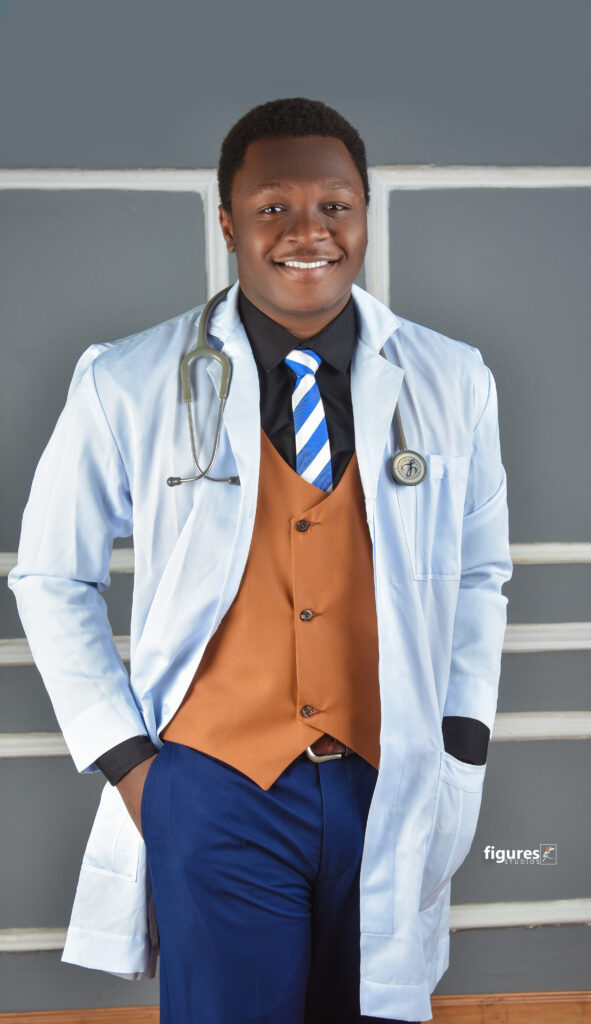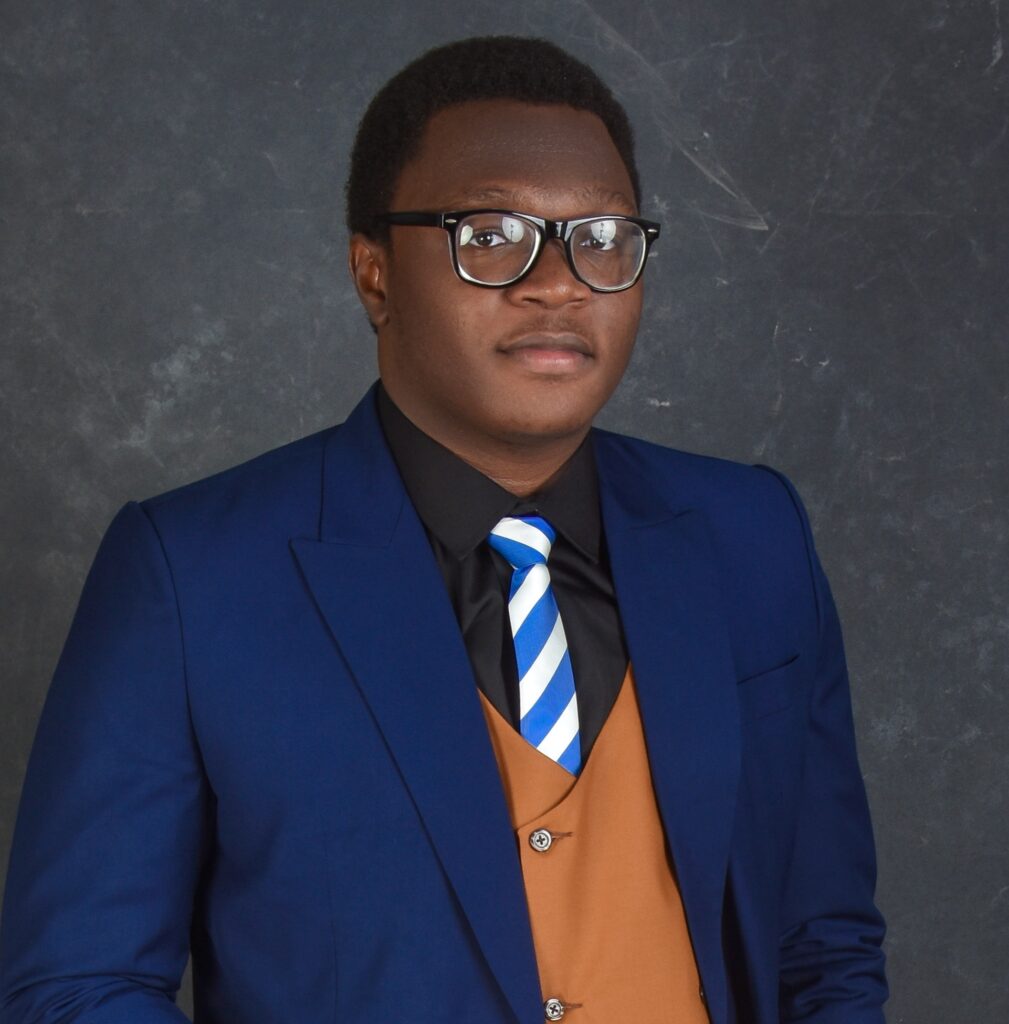Hello. Good evening, sir. How are you doing this evening?
Good evening everyone. Glad to be here!
It’s our pleasure to have this chat with you this evening. We’d like you to tell us about yourself, as much as you’d like to.
My name is Emmanuel Oyesiji. I am from a family of five (5), and I recently finished as a medical student. I enjoy watching movies, and I’m interested in Neuroscience. I’m an easy-going person. I like to travel, and I love to meet new people to an extent ‘cause I’m not exactly an outspoken person.

Quite an interesting personality! I like the blend – movies, meeting people and all, still not being all outspoken.
Thank you; take the meeting new people with a pinch of salt. Like we all know, I just finished medical school, so I’m currently waiting for my internship. In the meantime, I’m just resting and recuperating from the stress of the final exam and everything. It’s been a long journey, and I’m just glad to be finally done.
What was your reaction when you found out that you were the Valedictorian?
Finding out I was the valedictorian, I was overjoyed. I was really happy.
Joy! I can imagine the relief you must have felt after putting in so much effort. It must have been draining to have people expect that from you. Did you start medical school with the intention of being the best graduating student, or was it something that happened along the way?
I guess it was a driving force. No, I did not start with that intention. I just wanted to be successful and be above average throughout my medical journey. At first, I was intimidated by the calibre of medical students that were admitted that time, so I didn’t see myself at first. It’s just something that happened along the way. I’m not saying that I wasn’t intentional about it. I was just lucky, and it’s just something that happened over the years – something that I then decided I wanted. Towards the end, yes, but at first, not really. I had other goals I wanted to achieve.
It’s easy to feel intimidated in the midst of medical students. All that stuff. What would you attribute most of your success in medical school to? Diligence? Effort? Luck?
I would say it was a combination of everything – diligence, working hard, planning and not settling for average. God definitely helped -favour from God in clinical exams. Luck or let me say God was involved, sometimes things you read the night before come out in the exams, and you’re like, wow, thank God.
Nice. But then, will you say one factor was most prominent? Or they all just complemented one another? I want to believe this was beyond just luck.
Definitely! A lot of hard work went into it, attending classes, support from my parents and classmates through various discussions.
What is your social life like? What are your other interests asides from medicine?
I’m a curious person. I like knowledge and knowledgeable people. This was the major reason I joined the UIMSA quiz club. It gave me the opportunity to learn new and fascinating things outside medicine – art, music, literature. In my final year, I was elected as the vice president of the club, and I assisted in organising and coordinating activities – preparing for quiz competitions and delegating tasks. I also like giving back to the community; it’s why I joined the Hamstrings club, a socio-philanthropic club. Some of the activities I participated in were the annual blood donation drive, charity walk where we sourced funds for indigent paediatric patients on the ward in UCH. I was also elected as the bursar. I’m also interested in a tiny way as I joined the UIMSA Congress in my final year. There was a call to service, and I answered the call.
We have a serial volunteer here. Balance must have been something you strove for intentionally. It’s good to know that you’re not amongst the people that get intimidated by knowledge. What do you have to say about balancing medical school with extracurricular? Is balance a myth, or is it achievable?
That’s the gold standard. It’s not a myth. Balance is key in the quest to becoming a well-rounded student. This helps to prepare for the outside world. The demands of medical school are high, and striking a balance can be difficult. You don’t have to have it all figured out at once. It’s a process; start low and slow; find little things, responsibilities you’re interested in. Evaluate yourself constantly through your test scores, and attendance at classes.

Thank you for this. Start low and slow, instead of rushing neck-deep into so many activities at once. What was Preclinicals like for you?
I think one thing that stands out is time. I had a lot of time to myself and for myself. I needed to find my footing; there were a lot of new concepts and demands. Trying to keep up with classes, I remember when we started receiving lectures on neuroanatomy, I had difficulty following what was being taught in class but I didn’t let that discourage me from doing my homework or going back to my books. Also, it was a period filled with anticipation, the anticipation of what clinical school looked like and not wanting to be left behind.
Wow! We need you to show us the way. Time just seems to be in a race with itself here. But then, this brings us back to the balance talk. What’s your typical stressful day like? How were you able to combine the choking classes and clinical schedules with studying?
It starts at 6:30 am for ward round and ends with being on call far into the night. Having to repeat that for about a week was the real ghetto. Combining classes and clinical schedules: Sometimes, I had no time to sit down and study because of the various demands. A lot of times, I pushed whatever I needed to cover for that week or posting to the weekend. One thing that helped me was maximising any free time while I was in school, using my free time to quickly check things up on my phone or jotter.
I can’t imagine. I’m happy for you that that rigour is in the past now. Time management is something everyone would need to perfect at some point in medical school. How were you able to retain knowledge with the bulk of work to study and the high evaporation rate of stuff?
This was one of my major challenges. There really is a lot to learn and retain. One thing that has stuck with me over time is that repetition aids learning. I’m still looking for ways to retain more of what I read, but one of the things that helped me was starting my reading as early as possible; this gave me time for revision, however little when tests came. Relating a concept to another also helped. Medicine is interrelated. Compartmentalizing knowledge doesn’t really help much. Talking to people, as we call it “moving stuff”. I found that when you’re patient enough to discuss topics, especially difficult ones with people, it helps retention a lot. Attending classes, going for activities, and acting out what one has read especially on the clinical side helps. When you practice what you’ve learnt over and over, it helps to consolidate memory. Also, taking a break when necessary cannot be overemphasised. I took breaks by sleeping, watching movies, and talking to people.
This is really helpful. Repetition aids retention. Did you ever consider quitting? If so, what stopped you?
Not really. There were very difficult moments for sure, but I always told myself I was too far gone. “You’ve come all this way, you can’t give up now”. God kept me going, and my parents and their prayers were very instrumental. “Winners never quit, and quitters never win”.
Amazing! Even despite achieving this great feat, what’d you have done differently?
Talked to people more; Formed lasting relationships early on in med school. Relationships are very important; they keep you going when it gets tough. Support systems are very important in medical school. I would like to have studied more.
I believe, in a way, these opportunities will still present themselves to you again as you progress in your career. What would you say is the next step in your career progression?
Internship and some research here and there. In ten years, I hope to be where God wants me to be. I see myself as a specialist in a neuro-related field and also a philanthropist giving back to the community.
Aww! That’s awesome. What big brother advice will you give the members of the Preclinical arm?
Study hard, have goals and pursue them. Don’t settle for average. Have fun. Make friends, go out, and take breaks when necessary. You don’t have to have it all figured out; it’s a process…stick with it!
Thank you so much for the advice. Your words are invaluable. Thank you for your time, and for inspiring us with your answers. We wish you the very best as you move on to the next phase of your life.
Thank you for having me.

4 comments
I wish and aim to do twice of what u have son Doc.Emmanuel
This is a great say-up. I love this. Congrats to you
Beautiful! Welldone and congratulations ❤️
Thanks